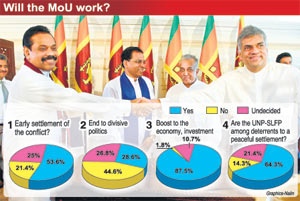
| Mixed bag for SLFP-UNP pact A cross section of Sri Lanka’s business community, civil society and professionals was polled by The Sunday Times FT last week on the MoU between the SLFP and the UNP but the results proved contrary to what most people would have expected, analysts said. Respondents were wary saying these ‘were good first steps” but warned of another possible insurgency if the JVP was sidelined. The email poll, a regular feature on issues of national importance that impacts on the business community, asked for responses to the impact of the new alliance on peace, the economy, divisive politics and whether the two parties – apart from the LTTE – were part of the reason why the country is not at peace. The survey also drew many comments with one of the key issues being people being sceptical. One pithy remark to the question on whether this would end confrontational politics, was “Dream on” which implied that politicians cannot be ‘ever’ trusted. Cynics also raised the spectre of both sides ‘taking the country for a ride and benefitting financially”. The issue of whether Sri Lankan leaders are sincere and courageous came out strongly while there was also concern that there won’t be any opposition to challenge wrongdoing, corruption and inefficiency. With full details of the MoU not in the public domain, the survey also raised the issue of elections and what would happen if there was a poll. But the majority (64 %) strongly felt the two parties – apart from the LTTE – were the stumbling blocks to peace with the opposition (either the SLFP or UNP) opposing a political settlement for the sake of opposing. Business leaders, most of who welcomed the ‘pact’, however stressed the need for a strong civil society movement inclusive of the business community to make sure the MoU works, instead of solely blaming the two sides if it fails. Nihal Perera, President of the Travel Agents Association of Sri Lanka, saw this as a positive message to carry to the forthcoming World Travel Mart in London in which a strong delegation is going from here. Kishu Gomes, Managing Director, Caltex Ltd and an outspoken young business professional, agreed that it is time for everyone to get together to support this cause. “The business community and Sri Lankans need the parties to focus on the political aspects and focus on the peace initiatives which are crucial for business. Pressure has to be exerted and maintained and we respect the two parties for what they have done. But they have to be constantly reminded of the benefits for the country.” Renton de Alwis, a former Tourist Board chairman, believes civil society, the business community and media leadership must go beyond issuing statements to make sure it works. He called for an ongoing ‘intelligent’ public dialogue on how this alliance can work for the good of the country without leaving it only to those who have come together. “That dialogue must be on each of the six agreed issues and must be with a view to assisting the political leadership to look beyond their own agenda.” Ranjit Page, Managing Director of Cargills Group and the Food City Supermarkets, repeated what he has always stood for – work instead of talk. “We need to stop commenting and work to ensure this effort succeeds.” Deva Rodrigo, former Chairman of the Chamber of Commerce (CCC), said the private sector and in particular, the CCC, has been promoting a bipartisan approach towards resolving issues of national importance. The MoU was an encouraging and promising development though the past is replete with failures in such attempts. He said civil society and business leaders should spread the word that politicians who impede the success of this effort would be rejected by the voters and challenge those attempting to return to divisive politics. |
| || Front
Page | News
| Editorial
| Columns
| Sports
| Plus
| Financial
Times | International
| Mirror
| TV
Times | Funday
Times || |
| |
Copyright
2006 Wijeya
Newspapers Ltd.Colombo. Sri Lanka. |
 Just
53 % of the 250 respondents believe it would help seek a political
settlement to the national issue while many were undecided. However
an overwhelming 87 % said it would help boost the economy, encourage
business and investment which was a contradiction of the response
to the first question. “This shows that a good 30 % in the
first question response were hoping against hope that the alliance
would work while also having their reservations,” one analyst
said, reviewing the results.
Just
53 % of the 250 respondents believe it would help seek a political
settlement to the national issue while many were undecided. However
an overwhelming 87 % said it would help boost the economy, encourage
business and investment which was a contradiction of the response
to the first question. “This shows that a good 30 % in the
first question response were hoping against hope that the alliance
would work while also having their reservations,” one analyst
said, reviewing the results.